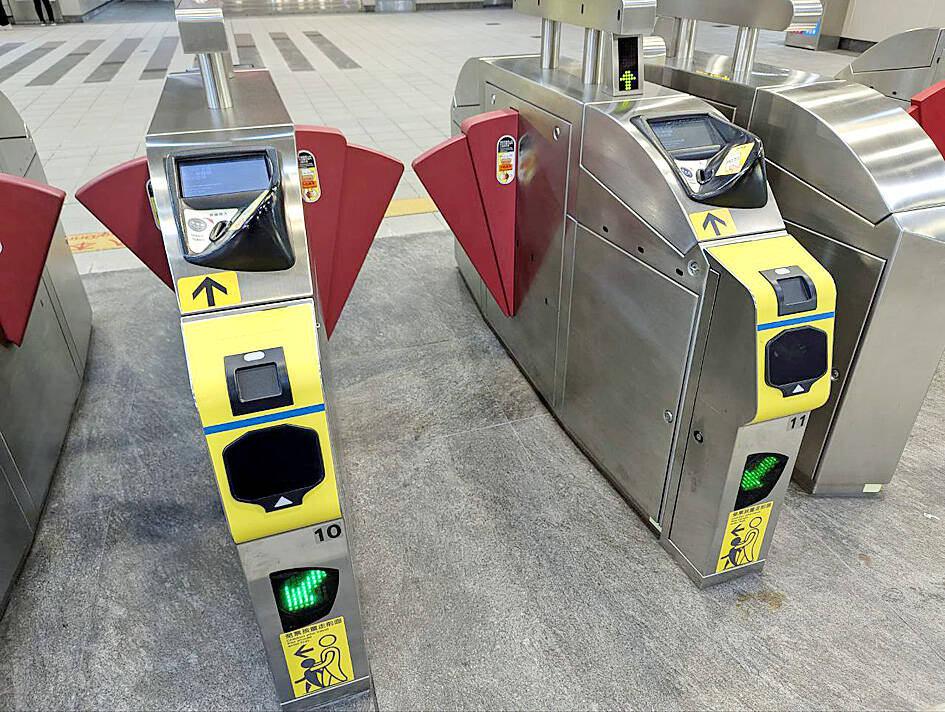New ticketing gates for the Taipei metro system are expected to begin service in October, allowing users to swipe with cellphones and select credit cards partnered with Taipei Rapid Transit Corp (TRTC), the company said on Tuesday.
TRTC said its gates in use are experiencing difficulty due to their age, as they were first installed in 2007.
Maintenance is increasingly expensive and challenging as the manufacturing of components is halted or becoming harder to find, the company said.

Photo: Lin Cheng-hung, Taipei Times
Currently, the gates only accept EasyCard, iPass and electronic icash tickets, or one-time-use tickets purchased at kiosks, the company said.
Since 2023, the company said it has invested NT$453 million (US$13.7 million) in redesigning the software system used by the gates.
Once implemented, the new system would allow people to swipe in and out of stations using phones with Apple Pay, Google Pay or Samsung Pay, it added.
The company is also working with Line Pay, JKOS Network, iPass Money, PX Pay Plus, EasyWallet, icash Pay, Taiwan Pay, Taishin Pay and others to allow people to swipe QR codes for faster boarding and alighting.
A total of 1,396 ticketing gates across 117 stations would be replaced with the new software, the TRTC said.
As of November last year, the company had already updated 639 ticketing gates, and is expected to complete upgrades by March, giving the company a grace period of six months to test the system and ensure it is compliant with the Payment Card Industry Security Standard.
The company said it plans to replace primary components to extend the overall service life of ticketing gates, increase maintenance efficacy and avoid situations in which maintenance is impossible due to a lack of components.
Separately, Taipei City Councilor Lin Liang-chun (林亮君) on Tuesday said that the Taipei City Government should review public transportation ticketing systems and allow automatic top-ups such of payment methods.
Lin said the public has long complained that buses in Taipei and New Taipei City were less than convenient, as the auto top-up function allegedly does not work on ticketing systems, or did not allow payment by QR code.
Lin said 150,000 people rode buses using cobranded cards, and about 4,000 experienced difficulty paying because the systems did not recognize the cards’ auto top-up functions.
Buses in Taipei and New Taipei City also lack the newer ticket verification systems employed by Kaohsiung and Taichung, Lin said, adding that upon further investigation, it was because buses in Taipei and New Taipei City did not have a camera installed on their verification system and was unable to scan QR codes.
Taipei Department of Transportation General Planning Division Director-General Liu Kuo-chu (劉國著) said that the municipal government is in talks with credit card companies to allow auto top-ups for EasyCards, iPasses and icash cards, and such systems could be implemented as early as next year.
The Taipei City Government plans to install systems with cameras that would allow the scanning of QR codes for payment, which would help foster willingness to ride on buses for travel to and from metro stations, Liu said.
Additional reporting by CNA

Taiwan has received more than US$70 million in royalties as of the end of last year from developing the F-16V jet as countries worldwide purchase or upgrade to this popular model, government and military officials said on Saturday. Taiwan funded the development of the F-16V jet and ended up the sole investor as other countries withdrew from the program. Now the F-16V is increasingly popular and countries must pay Taiwan a percentage in royalties when they purchase new F-16V aircraft or upgrade older F-16 models. The next five years are expected to be the peak for these royalties, with Taiwan potentially earning

STAY IN YOUR LANE: As the US and Israel attack Iran, the ministry has warned China not to overstep by including Taiwanese citizens in its evacuation orders The Ministry of Foreign Affairs (MOFA) yesterday rebuked a statement by China’s embassy in Israel that it would evacuate Taiwanese holders of Chinese travel documents from Israel amid the latter’s escalating conflict with Iran. Tensions have risen across the Middle East in the wake of US and Israeli airstrikes on Iran beginning Saturday. China subsequently issued an evacuation notice for its citizens. In a news release, the Chinese embassy in Israel said holders of “Taiwan compatriot permits (台胞證)” issued to Taiwanese nationals by Chinese authorities for travel to China — could register for evacuation to Egypt. In Taipei, the ministry yesterday said Taiwan

Taiwan is awaiting official notification from the US regarding the status of the Agreement on Reciprocal Trade (ART) after the US Supreme Court ruled US President Donald Trump's global tariffs unconstitutional. Speaking to reporters before a legislative hearing today, Premier Cho Jung-tai (卓榮泰) said that Taiwan's negotiation team remains focused on ensuring that the bilateral trade deal remains intact despite the legal challenge to Trump's tariff policy. "The US has pledged to notify its trade partners once the subsequent administrative and legal processes are finalized, and that certainly includes Taiwan," Cho said when asked about opposition parties’ doubts that the ART was

If China chose to invade Taiwan tomorrow, it would only have to sever three undersea fiber-optic cable clusters to cause a data blackout, Jason Hsu (許毓仁), a senior fellow at the Hudson Institute and former Chinese Nationalist Party (KMT) legislator, told a US security panel yesterday. In a Taiwan contingency, cable disruption would be one of the earliest preinvasion actions and the signal that escalation had begun, he said, adding that Taiwan’s current cable repair capabilities are insufficient. The US-China Economic and Security Review Commission (USCC) yesterday held a hearing on US-China Competition Under the Sea, with Hsu speaking on